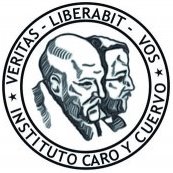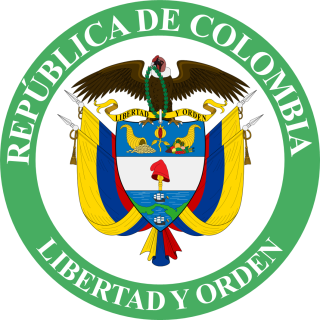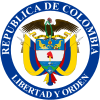
The General Archive of the Nation is a Colombian government agency ascribed to the Colombian Ministry of Culture charged with "conserving the historical legacy, as well as recovering and circulating the documentary heritage of the country". It is the head of the National System of Archives. The headquarters are located in the city of Bogotá and was designed by the architect Rogelio Salmona.

The Ministry of Commerce, Industry and Tourism or MCIT, is the national executive ministry of the Government of Colombia concerned with promoting economic growth though trade, tourism and industrial growth.

The Ministry of Foreign Affairs (MRE) also known as the Chancellery, is the Cabinet position of the Government of Colombia responsible for the international relations of Colombia through its diplomatic missions abroad by formulating foreign policy relevant to the matters of the State. It is equivalent to the foreign affairs ministries of other countries.
The National Administrative Department of Statistics, commonly referred to as DANE, is the Colombian Administrative Department responsible for the planning, compilation, analysis and dissemination of the official statistics of Colombia. DANE is responsible for conducting the National Population and Housing census every ten years, among several other studies.

The Caro and Cuervo Institute is an educative centre specialising in Spanish literature, philology and linguistics, with a focus on research and promotion of reading in Colombia. The institute produces editions of Colombian authors and promotes the of preservation of the national literary heritage. The institute was named after two well-known Colombian linguists, Miguel Antonio Caro Tobar and Rufino José Cuervo Urisarri.

The Institute of Hydrology, Meteorology and Environmental Studies, also known by its acronym in Spanish, IDEAM, is a government agency of the Ministry of Environment and Sustainable Development of Colombia. It is in charge of producing and managing the scientific and technical information on the environment of Colombia, and its territorial composition. The IDEAM also serves as the Colombian institute of meteorology and studies the climate of Colombia. The agency is currently led by the Director General, forestry engineer Yolanda González Hernandez. González Hernández is a specialist in Geographic Information Systems with a Masters in Meteorology Sciences from the National University of Colombia, and is the first woman to lead the agency.
The Administrative Department of Public Service is the Colombian executive administrative department in charge of formulating the general policies of public administration, especially in matters relating to civil service, management, internal control and streamlined procedures of the Executive Branch of Colombia.
The National Administrative Department of Solidarity Economy was a Colombian Executive Administrative Department in charge of directing and coordinating government policy to promote, plan, protect, strengthen, and develop the organizations of social economy in order to improve the quality of life of the Colombian people.
The Administrative Department of Sport, Recreation, Physical Activity and the Use of Free Time, Coldeportes was the national government department of sports in and for Colombia; it is charged with fomenting, planning and organizing the activities of sport and physical education.

Ministry for the Information and Communications Technologies, is the national executive ministry of the Government of Colombia responsible for overseeing the information and communication technologies, telecommunications and broadcasting industries in Colombia.
The Ministry of Social Protection was a national executive ministry of the Government of Colombia responsible for coordinating and implementing the national policy and social services relating to employment, labour, health and social security; it operated from 2002 to 2012.
The National Institute of Concessions, INCO, was a Colombian government agency in charge of funding the planning and execution of road, river, sea, rail and port transportation projects in the country. It was dissolved and replaced by the National Infrastructure Agency in 2011.

The National Roads Institute (INVÍAS) is an agency of the Executive Branch of the Government of Colombia in charge of allocating, regulating and supervising contracts for highway and roads construction and maintenance.
The Superintendency of Industry and Commerce (SIC) is the Competition regulator in Colombia. It is the statutory body of Government of Colombia in charge of regulating fair business practices, promoting competitiveness and acting as the Colombian patent and registration office.

The Superintendency of Corporations is a regulatory agency of the Government of Colombia that oversees corporations
The Nasa Kiwe National Corporation for the Reconstruction of the Páez River Basin and its Surrounding Areas, or Nasa Kiwe Corporation (CNK), is a relief agency of the Government of Colombia created after the 1994 Páez River earthquake and its following aftermath, to help the victims and the affected communities of the Paez River basin area and to finance reconstruction projects.

The Ministry of Labour is the national executive ministry of Colombia in charge of formulating, implementing, and orienting labour policy and labour relations to stimulate job growth through job creation programs. It is also in charge of labour rights, pensions, and occupational safety and health in Colombia.

The Ministry of Housing, City and Territory is the national executive ministry of Colombia in charge of formulating, implementing, and orienting housing policy, urban planning, and water supply and sanitation services in the country.

The Ministry of Environment and Sustainable Development is the national executive ministry of the Government of Colombia in charge of formulating, implementing, and orienting environmental policy to ensure the sustainable development of the country.

The National Infrastructure AgencyANI, is a Colombian government agency, part of the Ministry of Transport, in charge of concessions through public–private partnerships, for the design, construction, maintenance, operation, and administration of the transport infrastructure in Colombia.












